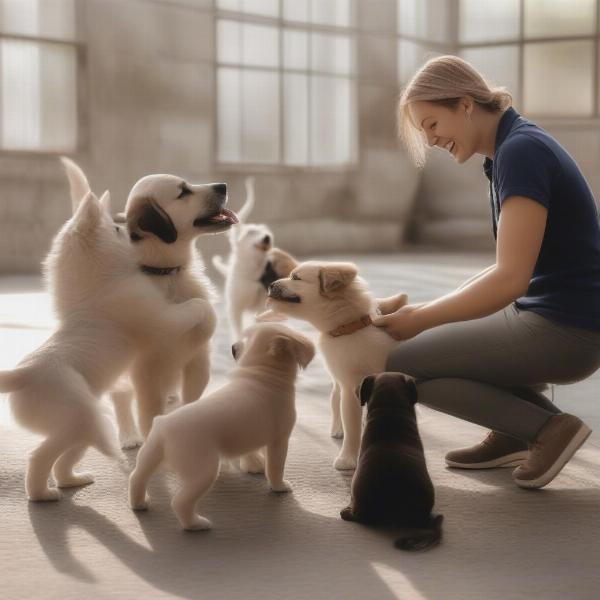Dog socialisation classes are a crucial aspect of raising a well-adjusted and happy canine companion. These classes offer a structured environment for puppies and adult dogs to learn appropriate social skills, build confidence, and reduce the risk of behavioural issues in the future. Whether you’re a first-time dog owner or have years of experience, understanding the benefits and finding the right class for your furry friend is essential.
Why are Dog Socialisation Classes Important?
Socialisation isn’t just about letting your dog play with others. It’s a crucial learning period where they develop the skills to navigate the world confidently. Puppies, in particular, have a critical socialisation period between 3 and 14 weeks, where their brains are most receptive to new experiences. Missing this window can lead to fear, anxiety, and aggression later in life. Even adult dogs can benefit from socialisation classes, particularly if they have a history of limited social interaction or behavioural problems.
 Puppies interacting in a socialisation class
Puppies interacting in a socialisation class
Benefits of Socialisation Classes
- Develops essential social skills: Dogs learn how to communicate appropriately with other dogs, understand canine body language, and engage in healthy play.
- Builds confidence: Exposure to new sights, sounds, and situations in a controlled environment helps dogs become more confident and adaptable.
- Reduces fear and anxiety: Early positive experiences can prevent the development of fear-based behaviours towards other dogs or people.
- Prevents aggression: Proper socialisation reduces the risk of aggression stemming from fear or insecurity.
- Improves leash manners: Many classes incorporate basic obedience training, helping dogs learn to walk politely on a leash even in stimulating environments.
- Provides opportunities for supervised play: Play is vital for physical and mental well-being, and classes provide a safe space for dogs to interact.
- Strengthens the bond between dog and owner: Working together in a class setting fosters a stronger bond and improves communication.
Choosing the Right Dog Socialisation Class
Not all dog socialisation classes are created equal. Finding a class run by a qualified and experienced trainer using positive reinforcement methods is essential. Avoid classes that encourage punishment or dominance-based techniques, as these can be detrimental to a dog’s well-being.
What to Look for in a Class
- Qualified instructor: Look for trainers certified by reputable organisations or with significant experience in positive reinforcement training.
- Small class size: Smaller classes allow for more individual attention and ensure that each dog receives appropriate supervision.
- Age-appropriate groups: Puppies and adult dogs should be separated into different classes to ensure appropriate interactions.
- Safe and clean environment: The training space should be secure, clean, and free from hazards.
- Positive reinforcement methods: The trainer should use positive methods, such as rewards and praise, to motivate and encourage desired behaviours.
- Focus on socialisation, not just play: While play is important, the class should also emphasise teaching dogs appropriate social skills and interaction.
Making the Most of Dog Socialisation Classes
Attending a socialisation class is just the first step. Reinforcing the skills learned in class at home and in other real-world settings is crucial for long-term success.
Tips for Continued Socialisation
- Practice in different environments: Gradually introduce your dog to new places, people, and situations outside of the class setting.
- Supervise interactions: Always supervise your dog’s interactions with other dogs and intervene if necessary to prevent negative experiences.
- Use positive reinforcement: Continue to reward desired behaviours, such as calm greetings and appropriate play.
- Be patient and consistent: Socialisation is an ongoing process, so be patient and consistent with your efforts.
Conclusion
Dog socialisation classes provide invaluable benefits for puppies and adult dogs alike. By investing in these classes and continuing to reinforce the skills learned, you can help your furry friend develop into a well-adjusted, confident, and happy companion. Remember to choose a class carefully and focus on positive reinforcement methods to ensure a positive and enriching experience for your dog.
FAQ
- When should I start socialising my puppy? The critical socialisation period is between 3 and 14 weeks, so start as early as your veterinarian recommends.
- How long should my dog attend socialisation classes? The duration varies, but several weeks or months is often recommended to solidify learned skills.
- What if my dog is reactive or fearful? Consult with a qualified trainer who specialises in working with reactive or fearful dogs. They can recommend appropriate strategies.
- Can older dogs benefit from socialisation classes? Yes, even older dogs can learn and improve their social skills with proper guidance.
- Are there alternatives to formal classes? Supervised playdates with well-socialised dogs and exposure to new environments can supplement formal classes.
- How do I find a reputable dog socialisation class? Ask your veterinarian, local dog trainers, or search online for classes in your area that use positive reinforcement methods.
- What if my dog doesn’t seem to enjoy the class? Talk to your trainer. They can help identify any underlying issues and suggest modifications to make the experience more positive.
About ILM Dog: ILM Dog is your trusted international resource for expert dog care and training advice. We cover everything from breed selection and puppy care to senior dog health and behavioural training. Our mission is to empower dog owners worldwide with the knowledge and resources they need to raise healthy, happy companions. For expert guidance tailored to your dog’s needs, contact us via email at [email protected] or by phone at +44 20-3965-8624.